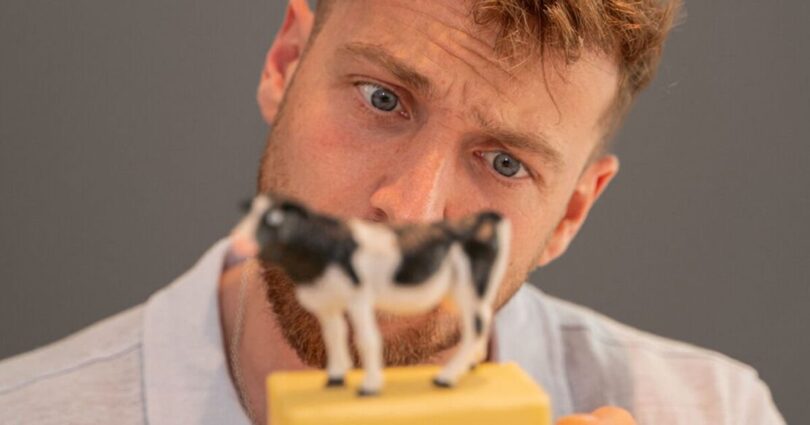Four in ten adults of all ages think the consumption of cow’s milk and butter will have declined or stopped completely in just 10 years’ time, according to new research into everyday British habits.
Eating things such as butter that has been processed through a cow’s stomach, drinking alcohol when we know it can make us ill, shaking hands as a greeting and even bedding down for the night are among the top 10 rituals that on reflection we find to be bizarre.
And a fifth (20%) of 18-24 year-olds believe that most people will come to see drinking milk, eating cheese and butter as ‘weird’ within the next decade while 39% said it was because more of us will be opting for lower calorie alternatives.
Talking to ourselves, our plants and pets, dancing in front of the mirror and knocking on wood for good luck were amongst other things that many do on a daily basis but admit we now see as rather odd.
Flora, the plant-based brand, asked 2,000 British adults to take a closer look at their everyday behaviours and see if they found that any of them could be considered ‘weird’.
When sleeping was described as ‘sinking into a state of unconsciousness on foam-filled resting squares’ a third (33%) found sleeping to be the weirdest thing we do!
Two thirds (66%) of the adults surveyed said they drink alcohol, although this dropped to 55% of Gen Z who don’t agree with the notion of shelling out on liquids that might induce nausea – with 15% saying the thought of doing so was downright strange.
While only 24% of Gen Z currently eat dairy butter, compared to 40% of all adults, when they considered it had started off as grass before being passed through a cow’s four-chambered stomach to be broken down into milk and then churned, only 10% of them could consider it ‘normal’ to eat it.
The biggest incentive for giving up dairy within the next decade was the impact on the environment (55%), the availability of plant-based alternatives (44%) and the sheer weirdness of the production process (15%).
Flora has teamed up with I’m a Celeb winner Sam Thompson to celebrate some of the odd things we have normalised. Sam, who was crowned King of the Jungle after eating a camel’s penis, has created ‘Milking It’ a comedy sketch on Instagram examining our eccentric habits.
Sam said: “Working with Flora has been an udder delight and it’s been a lot of fun thinking about how weird some of our everyday behaviours actually are. Like why we indulge in butter churned straight from a cow’s grassy feast rather than going for the plan-based option? I HAVE NO IDEA. If you feel the same and are up for a laugh about the quirks of our daily routines that we’ve all accepted as normal, head over to my Instagram for my sketch unpacking the lot. Like me, you may want to rethink what you’re spreading on your morning toast.”
Calling out odd ‘normal’ behaviours has gained traction online in recent months, with TikTokkers such as @undiagnosedadhd9 driving the conversation – he questions why us humans create and watch movies to deliberately scare ourselves (even though we know it’s not real), and asks ‘who decided when you like someone you kiss them?’.
@shesnotfunnytiktok has also covered the subject, discussing how weird it is that we hang art on our walls – because ‘it’s nice and I want to look at that every day’ – or the fact we lie down on our ‘resting squares’ (aka beds).
Ian Hepburn at Upfield which produces the Flora brand said: « The findings have really shone a light on the fact that we have so many behaviours and practices that we’ve normalised, but they are, on reflection, just a little bit weird! We wanted to challenge some of those norms – such as the practice of consuming dairy products like cow butter.
“It’s something that no other species on the planet does, yet we’ve completely normalised doing so. We hope it makes people stop and think, and that it prompts positive change when it comes to the consumption of dairy and its resulting impact on the environment.”
Source link








